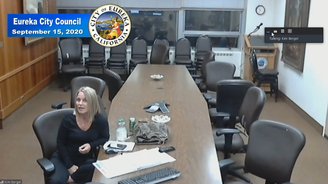At an almost five-hour-long meeting Tuesday night, the Eureka City Council voted 4-1, with Councilmember Natalie Arroyo dissenting, to send a letter to the California Department of Public Health (CDPH) stating that it does not support the state’s reauthorization of the Syringe Exchange Program (SEP) operated by the Humboldt Area Center for Harm Reduction (HACHR).
The letter states that HACHR has violated the City’s Syringe Exchange Program ordinance — adopted by the city council in 2018 — by not providing quarterly reports to the city council on its operations and that HACHR staff “has not collaborated with both the City and the neighboring community over the last two years.”
Jessica Smith — HACHR board member and previous executive director — read a prepared statement to the council addressing some of the issues stated in the city’s letter. Smith admitted that in her year as executive director she had failed to consistently send the quarterly reports requested by the council. But, Smith said, her mistake does not reflect the organization. HACHR does also send yearly reports to the CDPH, Smith said.
Smith added that HACHR has made many attempts to involve city staff in its operations and said that many of the neighbors do support HACHR, while others have complaints that are beyond the organization’s control.
“Neighborhood complaints about HACHR are actually complaints about the visible signs of poverty, homelessness and drug use,” Smith said to the council. “HACHR did not create these issues, they do not contribute to these issues and they absolutely do their best to mitigate these issues.”
Police Chief Steve Watson spoke about his views on the organization and addressed the Eureka Police Department’s recent investigation into HACHR’s operations. The report from that operation included officer accounts of witnessing multiple drug deals and use on or near the HACHR property on Third Street. Watson wanted to be clear that the undercover investigation was “not a witch hunt” and was prompted by months of observation and multiple neighbor complaints.
Watson acknowledged that HACHR provides many valuable services but said he feels it is the responsibility of the organization to mitigate issues related to drug use and sales around its property. “I’m just not convinced that HACHR is the right fit for our community anymore,” he said. “In fact, I feel that it is not as it currently exists.”
Earlier in the meeting, the council also voted to repeal the city’s resolution supporting the Syringe Exchange Program operated by HACHR. The resolution was adopted by council in 2016 to show its support for the SEPs and to help HACHR to be eligible for funding.
The vote was 4-1, with Councilmember Leslie Castellano dissenting and was followed by a unanimous vote to replace the resolution with one that supports SEPs without mentioning HACHR. The resolution did initially include language supporting a mobile syringe exchange program in favor of a central location. But council opted to remove that language until staff could provide more information on the benefits of mobile syringe exchanges.
Community members spoke to both pieces of HACHR-related business, with many voicing support for the organization and the syringe exchange program.

Councilmember Kim Bergel | Screenshot from the Eureka City Council meeting over Zoom
Nezzie Wade of the nonprofit Affordable Homeless Housing Alternatives (AHHA) said that she has worked with HACHR and has seen the positive impact it has on the community, arguing that “it should not be penalized for this level of support.”
Other community members, however, spoke about issues they have with HACHR, saying that its Third Street location has been a nuisance in the neighborhood.
“Removing exchange from this location to leave it as a program space does nothing,” said Eureka resident Judy Sousa. “ They will still have people congregating to continue the same activities in the same manner at all times of day and night.”
The council ultimately decided that, although it appreciates the work HACHR has done, it was important to send the letter opposing the state authorization, which is set to expire on October 8.
Councilmember Kim Bergel expressed her issues with HACHR, saying that she feels the letter is important to show that the city will not tolerate the attitude from the organization.
“Honestly, I just feel like we’ve been down this road,” Bergel said. “I would love to mediate and to have a workable program. But I don’t have a lot of hope anymore. I feel like that’s been damaged. That trust has been damaged.”
###
PREVIOUSLY:
- City of Eureka Announces Opposition to HACHR Recertification, Releases Lengthy Report Chronicling Months-Long Undercover Surveillance
- HACHR Responds to City of Eureka Letter Opposing State Reauthorization
- HACHR Releases Statement Detailing Steps It Plans to Take Moving Forward
- Eureka City Council to Discuss HACHR’s Syringe Exchange Program; Consider Grant Funding to Aid Bars, Restaurants and Retailers Adapting to COVID-19
CLICK TO MANAGE